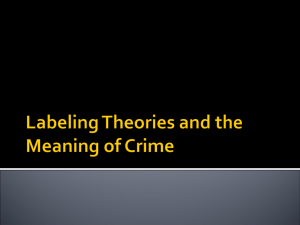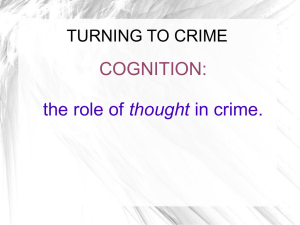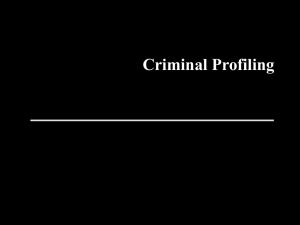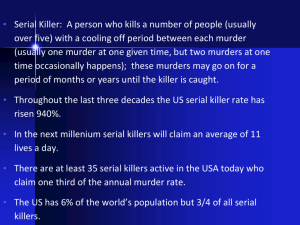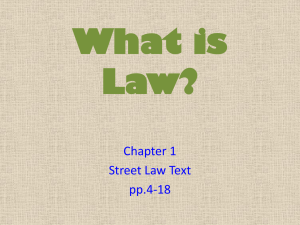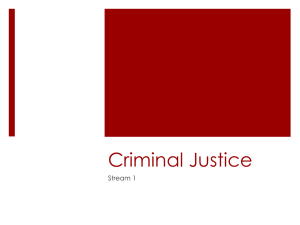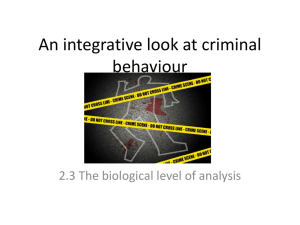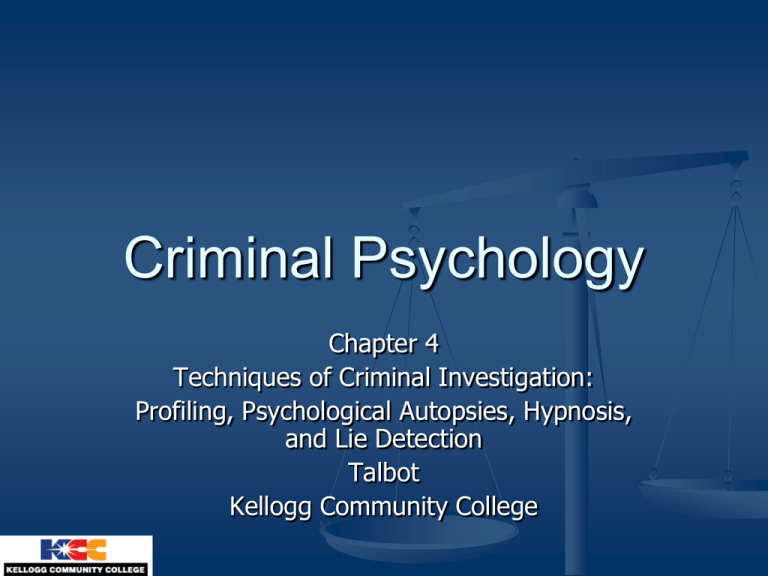
Criminal Psychology
Chapter 4
Techniques of Criminal Investigation:
Profiling, Psychological Autopsies, Hypnosis,
and Lie Detection
Talbot
Kellogg Community College
Profiling
Is it an appropriate topic for Forensic Psychology?
What is Criminal Profiling?
Is Clarice Starling typical? Maybe in Britain.
It is an application of psychological principles to the legal
field.
How is it different from Psychological/Personality
Profiles?
PP attempts to typically identify problems or
characteristics of one’s personality from information
provided by the subject.
CP is the process by which one applies & assesses
information from a crime in order to determine possible
characteristics of the perpetrator.
Psychological/ Personality Profile
Minnesota Multiphasic Personality Inventory
(MMPI - 2)
High reliability and validity (LFK)
Myers Briggs Personality Profile
DiSC Tests
Colors Personality Test
House-Tree-Person
California Personality Inventory
Criminal Profile
No “one” agreed upon method.
John Douglas
Ohio v. Lowe
“As a whole, the record reflects that Douglas’s opinion for the most part is
based on the behavioral science of clinical psychology, an area in which he
has no formal education, training or licensure… While we in no way
trivialize the importance of his work in the field of crime detection, we do
not find sufficient evidence… to qualify Douglas as an expert witness.”
Science or Art?
Criminal Profiling
Three approaches
Prediction of Individual Behaviors (CIA)
Determining Common Characteristics – Developing a
descriptive process for crime classification (Crime Classification
Manual).
Extracting Specific Characteristics (FBI)
1.
2.
3.
1.
Modus Operandi – method/ mode of operation
1.
2.
CHANGES in order to assist in the perpetrator’s efficiency.
Signature – a reflection of the unique, personal aspects of the
criminal act.
1.
NEVER CHANGES – Part of why they commit the crime.
Signature or M.O.?
A bank robber requires all bank patrons
and employees to remove their clothes
prior to leaving.
A bank robber requires all bank patrons
and employees to remove their clothes.
He then poses them and photographs
them.
Criminal Profiling
Three approaches
Prediction of Individual Behaviors (CIA)
Determining Common Characteristics – Developing a
descriptive process for crime classification (Crime Classification
Manual).
Extracting Specific Characteristics (FBI)
1.
2.
3.
1.
Modus Operandi – method/ mode of operation
1.
2.
Signature – a reflection of the unique, personal aspects of the
criminal act.
1.
3.
CHANGES in order to assist in the perpetrator’s efficiency.
NEVER CHANGES – Part of why they commit the crime.
Organized v. Disorganized
Organized v. Disorganized
Organized (nonsocial) Ted Bundy
Plan
Use restraints
Commit sexual acts with live victims
Emphasize control over the victim
Use a vehicle
Disorganized (asocial)
Leave a weapon at the scene of the crime
Reposition the dead body
Perform sexual acts with the dead body
Keep the dead body
Try to depersonalize the body
Not use a vehicle
Ted Bundy
1967
1969
1974
1978
– Linda Healy
– Parentage
- Carol DeRonch
- 1979
Criminal Profiling
Three approaches
Prediction of Individual Behaviors (CIA)
Determining Common Characteristics – Developing a
descriptive process for crime classification (Crime Classification
Manual).
Extracting Specific Characteristics (FBI)
1.
2.
3.
1.
Modus Operandi – method/ mode of operation
1.
2.
Signature – a reflection of the unique, personal aspects of the
criminal act.
1.
3.
4.
CHANGES in order to assist in the perpetrator’s efficiency.
NEVER CHANGES – Part of why they commit the crime.
Organized v. Disorganized
Serial v. Spree v. Mass
VICAP
Serial – Spree - Mass
Serial – Three or more separate events
with a cooling-off period. Joseph Kallinger
Spree – Killings at two or more locations
with no emotional cooling-off period.
Mass – More than three victims in one
location and within one event. Charles
Whitman
Psychological Autopsies
An investigative method used by psychologists
or other social scientists to help determine the
mode of death in equivocal cases.
e⋅quiv⋅o⋅cal
/ɪˈkwɪvəkəl/ Show Spelled Pronunciation [i-kwiv-uh-kuhl] Show
IPA Pronunciation
–adjective 1. allowing the possibility of several different meanings,
as a word or phrase, esp. with intent to deceive or misguide;
susceptible of double interpretation; deliberately ambiguous: an
equivocal answer. 2. of doubtful nature or character; questionable;
dubious; suspicious: aliens of equivocal loyalty. 3. of uncertain
significance; not determined: an equivocal attitude.
Psychological Autopsies
An investigative method used by psychologists
or other social scientists to help determine the
mode of death in equivocal cases (i.e. determine
the mode of death in questionable cases).
NASH classifications
Natural
Accidental
Suicidal
Homicidal
Psychological Autopsy
Victim
Circumstances
36 year old female
Mother of 2 children (ages 4 and 7)
Married to husband for 8 years
Fire department called by husband.
Husband claimed wife had been depressed for
approximately 2 years and had been recently making
suicidal comments.
Wife’s body was found on a couch, face down.
No note left.
Problems? The results can be equivocal as well.
Hypnosis
Definition: An altered state of consciousness
characterized by narrowed attention and
increased suggestibility.
Hillside Strangler 1977 - 1978
The case of Kenneth Bianchi
10 women murdered, raped, tortured and strangled to death.
Bodies found on hillsides northeast of Los Angeles.
Under hypnosis displayed DID traits including an alter ego Steve
Forensic expert in hypnosis cast doubt on this due to
slight inconsistencies in his actions.
Problems?
Hypnotic susceptibility?
Polygraphs
Lie Detector?
Measures Sympathetic Nervous System
activation as an indicator of truth.
GSR
Blood Pressure
Heart Rate
Respirations
Control Question Technique
Problems?
False Positive (Classification of truth tellers as liars)
False Negatives (Classification of liars as truth tellers).
Admissibility



